Select Language
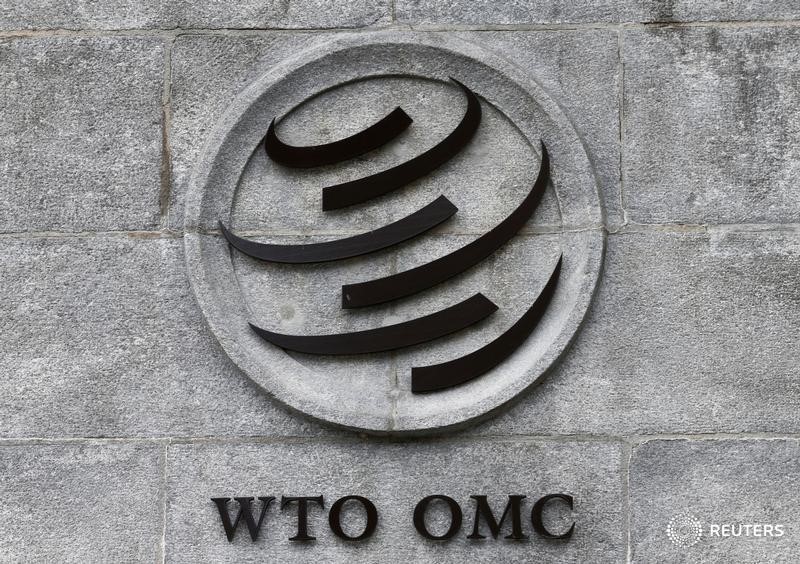
By Emma Farge and Rachna Uppal
ABU DHABI (Reuters) -Trade ministers from nearly every country in the world gathered in Abu Dhabi on Monday for a World Trade Organization meeting that aims to set new global commerce rules, but even its ambitious chief Ngozi Okonjo-Iweala sought to curb expectations.
The almost 30-year-old global watchdog, whose rules underpin 75% of global commerce, tries to strike deals by consensus, but such efforts are becoming more difficult amid signs that the global economy is fragmenting into separate blocs.
"Let's not pretend that any of this will be easy," Ngozi Okonjo-Iweala said in his opening speech, describing the atmosphere as "tougher" than the WTO's last 2022 meeting, citing wars, tensions and elections and signs that trade growth will undershoot the body's own estimate.
She called on ministers to "roll up their sleeves" and complete negotiations, but seemed to rule out any deal in Abu Dhabi on reforming the body's mothballed appeals court.
"We are not there yet," she said.
However, negotiators say they are still hopeful for an agreement that could buoy global fish stocks and protect fishermen by banning government subsidies.
"We are not in dreamland here. International cooperation is in bad shape. Real success would be fish, plus two or three things," one trade delegate told Reuters.
Other outcomes from the four-day meeting that are either definite or achievable are the accession of two new members - Comoros and East Timor - and a deal among some 120 countries to remove development-hampering investment barriers.
Tougher areas are extending a 25-year moratorium on applying tariffs on digital trade, which South Africa and India oppose, and an agreement on agriculture trade rules that has eluded negotiators for decades.
"The multilateral trading system with the WTO at its core is at a critical juncture; it is confronting many challenges," Thani Al Zeyoudi, conference chair and UAE's minister of foreign trade said in an opening address.
"The WTO remains a powerful force in countering the current unilateralism, protectionism, and discrimination."
FUTURE RELEVANCE
On Sunday, the UAE announced a $10 million grant to support WTO initiatives such as the Fisheries Funding Mechanism, the Enhanced Integrated Framework (EIF), and the Women Exporters in the Digital Economy (WEIDE) Fund, launched during the conference.
Zeyoudi said that trade and sustainability would be on the agenda as part of an effort to ensure the body's future relevance.
One factor that could help is the determination of Okonjo-Iweala, a former Nigerian finance minister, whose insistence on all-night meetings helped deliver a package of deals in Geneva in 2022.
"What makes me a bit more optimistic than others at this point is that the director-general is a very proactive person and is prepared to push ministers. Also, the UAE trade minister is very results-orientated," said Alan Yanovich, partner at law firm Akin Gump Strauss.
John Denton, International Chamber of Commerce Secretary General, said even a modest outcome such as a forward-looking ministerial statement that showed common purpose among governments would be worth taking.
"The WTO is a public good ultimately, and our view is that there is a major cost to the real economy from any erosion of that system," he said.
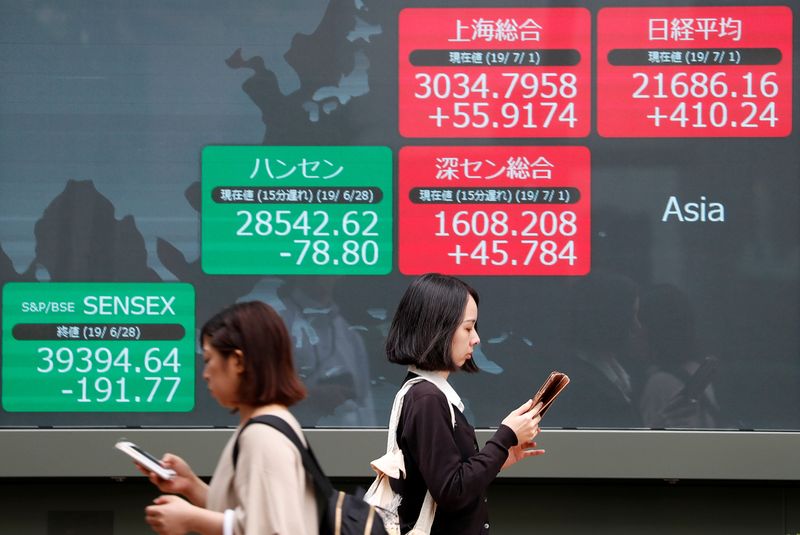
By Wayne Cole
SYDNEY (Reuters) -Asian shares stalled near seven-month highs on Monday as investors awaited inflation data from the United States, Japan and Europe that will help refine expectations for future rate moves.
The Federal Reserve's favoured measure of inflation - the core personal consumption expenditures (PCE) price index - is due on Thursday and forecasts are for a rise of 0.4%.
It was not long ago investors were hoping for just a 0.2% increase but high readings on consumer and producer prices suggest the risk is for a result as high as 0.5%.
Markets have already pushed out the likely timing of a first Fed easing from May to June, which is currently priced at around a 70% probability. Futures imply a little more than three quarter-point cuts this year, compared to five at the start of the month.
There are at least 10 Fed speakers on the docket this week, and are likely to repeat their mantra of staying cautious on rates. The ISM manufacturing survey is due on Friday, as are PMIs for China.
Despite the hawkish shift, Wall Street still managed to make new highs helped by huge gains for AI diva Nvidia (NASDAQ:NVDA), which added $277 billion in market value last week.
"This may be a catalyst not only for the Street to get materially more bullish on U.S. Equities but also to see a further decoupling of stocks and yields since the Mag7 are proving to deliver on earnings expectations irrespective of the interest rate environment," wrote analysts at JPMorgan in a note.
On Monday, S&P 500 futures and Nasdaq futures were both trading 0.2% lower. EUROSTOXX 50 futures and FTSE futures both eased 0.1%.
MSCI's broadest index of Asia-Pacific shares outside Japan dipped 0.3%, having climbed 1.7% last week to seven-month highs.
Those past gains were helped in large part by a rally in Chinese stocks, which have jumped almost 10% in as many sessions on hopes for more aggressive stimulus. Blue chips were off 0.4% on Monday.
Japan's Nikkei rose 0.5%, having climbed 1.6% last week to clear its previous record high as bulls look to test the 40,000 barrier.
INFLATION, ALL THE TIME
Figures on Japanese consumer prices are due out on Tuesday and are forecast to show core inflation slowed to 1.8% in January, the lowest since March 2022.
A soft result would add to the case against a tightening from the Bank of Japan, though policy makers seem to be counting on rising wages to justify putting an end to negative rates in either March or April.
Figures on inflation in the European Union are due on Friday, with the core again seen slowing to the lowest since early 2022 at 2.9% and bringing nearer the day when the European Central Bank might ease policy.
Markets are almost fully priced for a first cut in June, with April seen as a 36% chance.
The head of the ECB Christine Lagarde speaks later on Monday, as does the chief economist of the Bank of England.
Incidentally, the Reserve Bank of New Zealand (RBNZ) holds its first policy meeting of the year on Wednesday and there is some chance it might actually hike rates given stubborn inflation, even though the country likely slipped into recession in the fourth quarter.
The shift in Fed pricing saw Treasury yields hit a three month high last week, though bonds did managed to rally on Friday. The market faces a tough test later in the session when Treasury sells $127 billion of two- and five-year notes, with another $42 billion in seven-year paper due on Tuesday. [US/]
There is also a risk some U.S. government agencies could be shut down if Congress cannot agree on a borrowing extension by Friday.
In currency markets, higher bond yields globally have been a burden for the yen which hit multi-month lows on the euro, and a nine-year trough on the Australian and New Zealand dollars.
Early Monday, the euro sat at 162.70 yen, just off its peak of 163.45, while the dollar held at 150.45 yen and just short of its top of 150.88. [USD/]
The single currency was steady at $1.0816, having briefly been as high as $1.0889 last week.
In commodity markets, gold was a fraction softer at $2,032 an ounce, having rallied 1.4% last week.
Oil prices have drifted lower as concerns about demand, particularly from China, have outweighed risks to supply from the Middle East. [O/R]
Brent dipped 40 cents to $81.22 a barrel, while U.S. crude fell 37 cents to $76.12 per barrel.
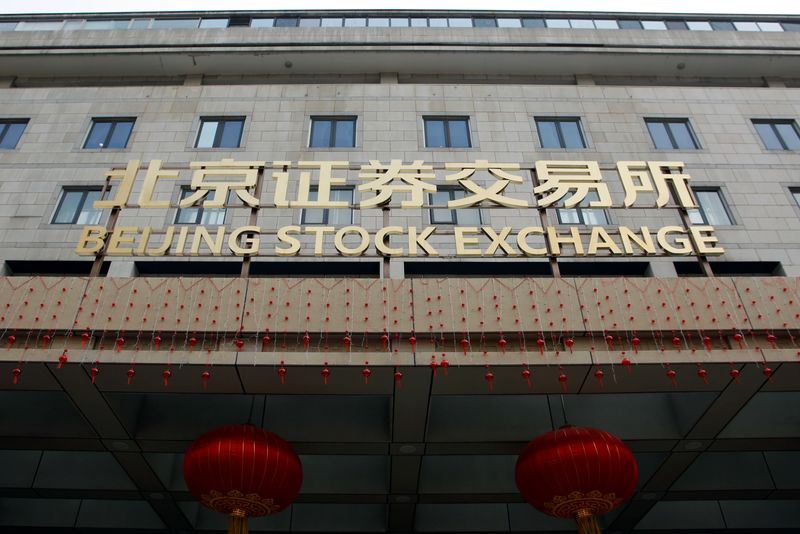
By Jamie McGeever
(Reuters) - A look at the day ahead in Asian markets.
Stock markets in Asia start the week with clear momentum behind them, especially in Japan and China, but may be vulnerable to a spot of profit-taking as investors pause for breath after last week's tech- and AI-fueled global buying frenzy.
The Asian economic calendar on Monday is light, with Japanese producer price inflation for January the main event, followed by industrial production from Singapore.
China's CSI 300 index of blue chip shares eked out a slender rise on Friday to seal its ninth straight day of gains and best run since January 2018. Another rise on Monday would mark its longest winning streak since late 2014.
Friday's rise was only 0.1% though, suggesting fatigue may be setting in.
For Japan, however, there's little sign of fatigue yet, at least not on the surface, with the Nikkei 225 surging more than 2% on Friday to a new all-time high. The 40,000-point mark will surely be traders' near-term target now.
The weak yen continues to help make Japanese assets attractive to foreign investors, and the dollar goes into Monday's session comfortably above 150.00 yen. Again, is a bout of profit-taking or even intervention imminent, or does recent momentum persist?
Hedge funds' bearish positioning in the yen has grown to historically high levels, the latest U.S. futures market figures show, so perhaps the FX market is ripe for a correction.
The dollar has had a good start to the year, up 2.5% against a basket of G10 currencies and even more against some key Asian currencies, most notably the yen. Morgan Stanley analysts recommend trimming dollar exposure against emerging Asia.
Japanese services PPI ended last year running at an annual rate of 2.4%, the fastest in almost nine years, indicating that broader inflationary pressures are building.
But overall annual wholesale price inflation, when manufacturing sector is taken into account, is virtually zero. Services and manufacturing are giving off very different signals.
Monday's services PPI comes a day before consumer inflation figures are released. The consensus is for core inflation to slow to 1.8% from 2.3% in December, which would be the first print below the Bank of Japan's 2% target in almost two years.
Japan's inflation rates are under close scrutiny as the BOJ prepares to lift interest rates into positive territory for the first time since 2016.
The main economic event in Asia this week could be China's purchasing managers index data on Friday, as they will offer an early glimpse into how manufacturing and service sector activity have fared this month. A tentative rebound may be underway in Chinese stocks, but there's little evidence yet of a similar recovery in the economic numbers.
The Chinese economic surprises index is barely in positive territory, even though expectations have been lowered substantially in recent months.
Here are key developments that could provide more direction to markets on Monday:
- Japan services PPI (January)
- Singapore industrial production (January)
- U.S. 2-year, five year bond auctions
(By Jamie McGeever; editing by Diane Craft)

(Reuters) -New York Federal Reserve President John Williams sees the U.S. central bank on track to cut interest rates "later this year," despite stronger-than-expected inflation and labor market data in January, according to an interview with Axios.
"My overall view of the economy basically hasn't changed based on one month of data," Williams said in an interview that was conducted on Thursday and published on Friday, noting that inflation's progress toward the Fed's 2% goal can be "a little bit bumpy," but that overall it and the economy more broadly are headed "in the right direction."
"At some point, I think it will be appropriate to pull back on restrictive monetary policy, likely later this year," Williams said, remarks that are in synch with those of other Fed policymakers who have been sounding somewhat cautious lately about starting to cut rates without more confidence on inflation's downward trajectory.
As vice chair of the Fed's rate-setting Federal Open Market Committee, Williams is an influential voice at the U.S. central bank, which has held its benchmark overnight interest rate steady in the 5.25%-5.50% range since last July.
He did not give any sense of his preferred timing for the start of rate cuts, nor of exactly what would trigger them, apart from an overall assessment that inflation is indeed headed sustainably toward the 2% target.
"It's really about reading that data and looking for consistent signs that inflation is not only coming down, but is moving towards that 2% longer-run goal," he told Axios. "I don't think there's any formula, or one indicator, or something that will tell you that. It's really looking at all the information together, including these signs in the labor market and others and extracting the signal."
While a material significant change in the economic outlook could require a rethink, he said, "rate hikes are not my base case," Axios cited him as saying.
BALANCE SHEET
Fed policymakers are expected to start in-depth discussions next month about slowing the central bank's ongoing reductions to its $7.63 trillion balance sheet.
The goal, Williams said, "is to make sure that we get a nice, smooth process of continuing to reduce the balance sheet down to the ultimate level that we want to get to and allowing us to monitor and analyze and understand how that reduction in the balance sheet is meeting that test that we set out for ultimately stopping."
In other words, he said, slowing the balance sheet reductions will give the Fed time to assess where and when it ought to stop altogether, and help it avoid the kind of market disruptions that occurred when it was trimming its balance sheet in September 2019.
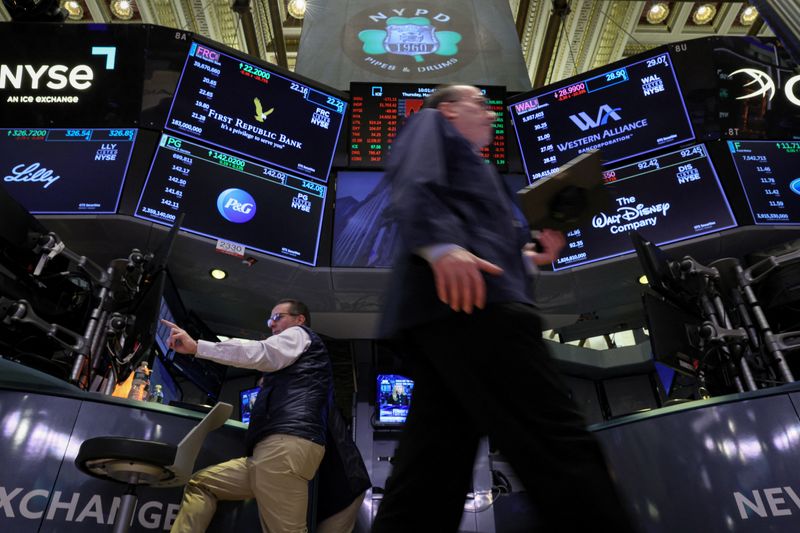
Investing.com -- Inflation will be in the spotlight; earnings season is winding down and oil prices look set to remain volatile. Here’s what you need to know to start your week.
US inflation
The inflation outlook is set to return to the fore this week with the release of January's personal consumption expenditures (PCE) price data on Thursday.
Recent economic data releases, including reports on as consumer prices, producer prices and employment have indicated that the U.S. economy remains robust despite a prolonged period of elevated interest rates.
That has prompted investors to push back bets on rate cuts by the Federal Reserve to later in the year.
Economists are expecting a 0.3% increase for January after 0.2% in the previous month. A stickier-than-expected reading could prompt the Fed to delay rate cuts further.
The economic calendar also features data on durable goods orders, the ISM manufacturing PMI, readings on new and pending home sales along with reports on consumer confidence from the Conference Board and the University of Michigan.
Retail earnings
Earnings season is winding down, but a number of big retailers are due to report earnings in the coming week, giving investors an important insight into the health of consumer spending.
Results from Lowe's (NYSE:LOW), Macy’s Inc (NYSE:M) TJX (NYSE:TJX) and Best Buy (NYSE:BBY) are due as markets are shifting focus away from earnings back to the monetary policy outlook.
Jack Ablin, chief investment officer at Cresset Capital, is among the investors who see benefits if the economy continues walking a fine line to a so-called “soft landing,” in which the Fed is able to cool inflation without upending growth.
"If we can get slowing growth, slowing inflation, create an environment that the Fed can start reducing interest rates... that should help the average stock," he told Reuters.
Eurozone inflation
The Eurozone is to release what will be closely watched inflation data on Friday, the last such reading before the upcoming European Central Bank meeting on March 7.
Consumer price inflation slipped to 2.8% in January from 2.9% in December, showing signs of moving back towards the ECB’s 2% target after soaring to double digits in 2022.
Economists are expecting an annual reading of 2.5% for February.
The ECB has held interest rates at record highs since last September, saying the wage growth is still too high to start unwinding its restrictive monetary policy.
Bundesbank President Joachim Nagel warned Friday that the ECB should resist the temptation to cut interest rates early, especially before crucial wage data in the second quarter.
China PMIs
Authorities in China have been ramping up efforts to shore up a fragile economic recovery, delivering the biggest ever reduction in the benchmark mortgage rate and boosting regulatory pressure to revive an ailing stock market.
PMI data on Friday will give some indication of how successful these measures have been.
Economists are expecting official PMI data to show that the manufacturing sector remains in contraction territory, while the Caixin manufacturing index is expected to hold steady.
Oil prices
Oil prices fell nearly 3% lower on Friday and posted a weekly decline after a U.S. central bank policymaker indicated interest rate cuts could be delayed by at least two more months.
For the week, Brent declined about 2% and WTI futures fell more than 3%. However, indications of healthy fuel demand and supply concerns could revive prices in the coming days.
Fed policymakers should delay U.S. interest rate cuts by at least another couple of months, Fed Governor Christopher Waller said on Thursday, which could slow economic growth and curb oil demand.
"The entire energy complex is reacting, because if inflation begins to come back it will slow demand for energy products," Tim Snyder, economist at Matador Economics told Reuters.
"That is not something the market wants to digest right now, especially as it is trying to figure out a direction," he added.
--Reuters contributed to this report
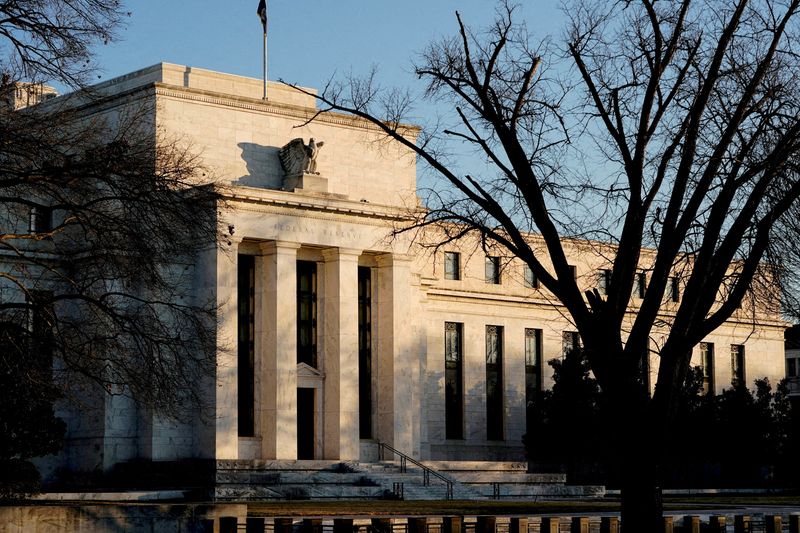
SINGAPORE (Reuters) - Goldman Sachs' analysts no longer expect a U.S. interest rate cut in May and see four 25 basis point cuts this year, as policymakers' rhetoric suggests they are in no rush.
Federal Reserve Governor Christopher Waller said on Thursday he needed to see a few more months of inflation data to check the economy was on track toward price stability.
"Because there are only two rounds of inflation data and a little over two months until the May (Fed) meeting, his comments suggest to us that a rate cut as early as May, which we had previously expected, is unlikely," Goldman Sachs analysts said in a note. They now forecast an extra cut next year instead, with an unchanged terminal rate forecast of 3.25-3.5%.

A look at the day ahead in European and global markets from Ankur Banerjee
Investors head to the weekend holding on to their risk-on hats as bourses across the world swell to all-time highs after AI darling Nvidia (NASDAQ:NVDA)'s blockbuster earnings revived a fiery rally in tech shares that may still rage on.
They will have a sprinkle of economic data from Germany to ponder on Friday, with European bourses due for a higher open, futures indicate.
Nvidia added an eye-watering $277 billion, or half a TSMC, to its market value on Thursday, with the optimism around AI taking the Nikkei, the STOXX 600 and the S&P 500 to record peaks on the same day.
Friday is turning into more of the same, with Asian stocks at more than a six-month high, led by technology shares. Japan markets are closed for a holiday.
Technology shares in Europe have been on a tear, climbing 12.5% so far this year but with technical indicators flashing warnings of overheating, we may yet see some profit taking by investors in the near term.
The pan-European STOXX 600's relative strength index sits just below the 70 threshold that signals an overbought market.
In the currency market, the yen hogs the spotlight, sliding to fresh lows on the euro, sterling and other crosses this week. The yen is the worst-performing G10 currency this year, with a 6.4% slide on the dollar. [FRX/]
The dollar index, which measures the U.S. currency against six rivals, is up 2.5% as traders come to the realisation that the Fed was perhaps not bluffing when it pushed back against early and steep expectations of interest rate cuts.
Goldman Sachs was the latest to push back its starting point of the Fed's easing cycle to June from May. Markets are also now pricing in June as the point at which the U.S. central bank will first cut rates.
Traders have also priced in 78 basis points of cuts in the year, down from 150 bps of easing at the start of the year and closer to the Fed's own projection of 75 bps of cuts.
In company news, Standard Chartered (OTC:SCBFF) will be in focus at the open after the Asia-focused bank announced a $1 billion share buyback and a jump in dividend, while reporting an 18% rise in 2023 pre-tax profit.
Key developments that could influence markets on Friday:
Economic events: Germany Q4 detailed GDP data; Germany Feb IFO data
Earnings: BASF
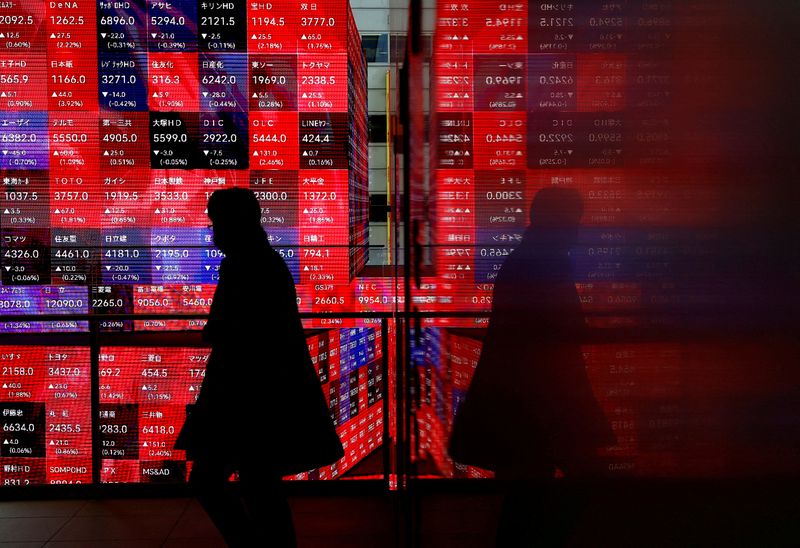
By Stella Qiu
SYDNEY (Reuters) - Asia stocks rose on Friday and put global markets on course for a week of heady gains as AI darling Nvidia (NASDAQ:NVDA)'s stunning results sparked a wave of record highs from Asia to Europe and the U.S., while the yen nursed losses on a range of currencies.
Nvidia surged 15%, adding a record $250 billion in market value on Thursday. The Santa Clara, California-based company's results supercharged a global AI-led rally in technology stocks, propelling the S&P 500, the Dow Jones Industrials, Europe's STOXX 600 and Japan's Nikkei share average to record highs.
Tokyo is closed for a holiday on Friday, with the Nikkei futures trading up about 300 points.
"The Nvidia effect has ripped through global equity markets and given fresh wind to markets that were looking ominously poised for a 3-5% drawdown," said Chris Weston, head of research at Pepperstone in Melbourne.
"Consider that Nvidia holds its highly anticipated GTC (technology) conference on 18 March – where they are likely to update the market on new products and innovations – so pullbacks in the stock should be shallow, and we could see buyers push price higher into that event," he said.
MSCI's broadest index of Asia-Pacific shares outside Japan rose 0.6%, bringing the weekly gains to 1.8%.
In a promising sign that Beijing's efforts to steady a market rout might be working, China's bluechips rose 0.4% on Friday and are set for a weekly gain of 4.0%. It has rebounded about 10% since plumbing five-year lows two weeks ago.
Hong Kong's Hang Seng index climbed 0.8%.
"The markets have been remarkably resilient given central banks have pushed back against early rate cuts... Along with continued mostly solid economic activity, particularly in the U.S., it's quite possible that any pause in markets is just another walk to the upside," said Shane Oliver, chief economist at AMP (OTC:AMLTF).
"I think the markets are sort of coming to the view well maybe we'll get the rate cuts. They may not be as much as we thought, and they might be later, but if the economic activity is still good then that's not a problem."
A Reuters poll showed that the recent rally in global stocks has a little further to go but they were divided on whether there will be a correction in the next three months.
The influential Fed Governor Christopher Waller on Thursday said policymakers should wait at least another couple more months to see if inflation is indeed heading back to target, signalling no rush to cut rates.
Rates markets continued to pare back U.S. policy easing expectations on the back of strong U.S. economic data. Jobless claims fell, home sales rose to a five-month high although the expansion in business activity slipped a little.
The first Fed cut is now fully priced for July, and just 80 basis points of easing is in this year's curve.
The cash Treasuries market is closed on Friday, but overnight, the ten-year Treasury yield rose to a three-month high of 4.3540% before paring some of the gains.
In Europe, traders also scaled back their bets on European Central Bank rate cuts to less than 100 bps this year after latest ECB minutes showed policymakers were wary of easing monetary policy too early.
In the foreign exchange market, the yen was little changed at 150.41 per dollar on Friday, above the critical 150 level that could draw possible Japanese intervention to slow the currency's declines.
However, the yen has taken a beating against a broad range of currencies as investors bet the Bank of Japan will still keep monetary policy accommodative even after ending negative interest rates.
The Australian and kiwi dollars hit 9-year highs on the yen overnight and were last fetching 98.71 and 93.14 yen. The euro hovered at 162.82 yen, nearing a 15-year high.
Oil prices fell after climbing on supply fears as hostilities in the Red Sea showed no signs of abating. A large build in U.S. crude inventories also weighed. [O/R]
Brent eased 0.4% to $83.37, while U.S. crude slipped 0.5% to $78.24 per barrel.
The spot gold price was flat at $2,026.07.
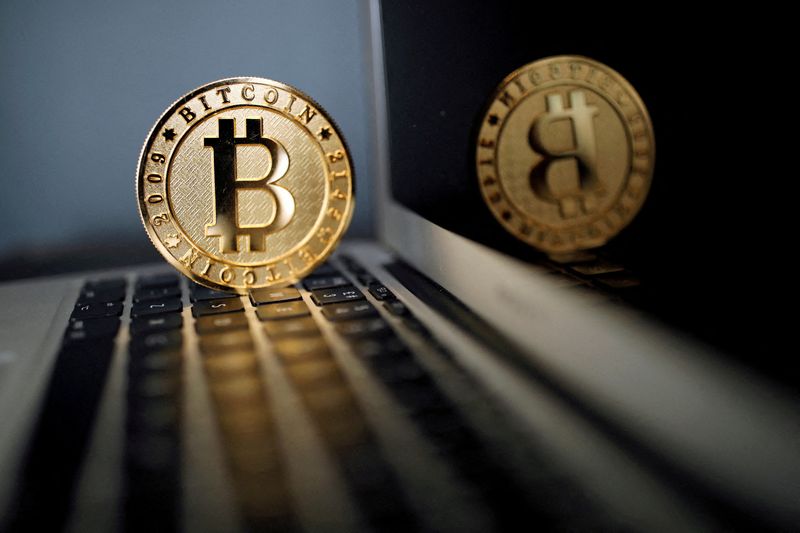
By Ashitha Shivaprasad and Manya Saini
(Reuters) -A surge of interest in bitcoin exchange-traded funds is prompting some investors to swap out holdings in gold-backed ETFs, although analysts and fund managers said they are unlikely to challenge bullion longer term.
Spot bitcoin ETFs could offer investors looking to hedge against inflation an alternative to gold. ETFs track an index, commodities, bonds or a basket of assets like an index fund.
And January's U.S. regulatory green light for ETFs that track the price of the world's largest digital asset has set the ETF market - worth trillions of dollars - up for further gains.
The advent of ETFs in gold in the early 2000s added a major pillar of support to the market by creating new demand, causing prices to soar in subsequent years.
"We anticipate that bitcoin could substitute for gold in some investor portfolios. It may serve a similar role as a hedge against global disorder and financial system dysfunction," said Jason Benowitz, senior portfolio manager at CI Roosevelt.
Since the Jan. 10 U.S. approval, two of the biggest new spot bitcoin ETFs, iShares Bitcoin Trust and Fidelity Wise Origin Bitcoin Fund, had accumulated $5.45 billion and $4.13 billion in assets respectively as of Feb. 14, LSEG Lipper data shows.
Meanwhile, the largest gold-backed ETF, New York's SPDR Gold Trust (P:GLD), saw outflows of $768.9 million over the same period, while the iShares Gold Trust had outflows of $284.6 million.
NEW HAVEN?
The launch of the new products comes against a rally in the prices of crypto tokens. Bitcoin surged more than 150% in 2023, while gold climbed a far more modest 13%.
"Overall, the crypto industry is maturing and ... with more regulatory approval and a new legitimized product, it's a growing threat to older havens like gold in some regions," Nicky Shiels, head of metals strategy at MKS PAMP SA said in a note.
Even so, some fund managers and analysts urged caution against migrating from gold ETFs, citing bitcoin's volatility.
"Gold has been valued for thousands of years, while bitcoin is in its infancy," said Bryan Armour, an ETF analyst at Morningstar.
Gold is typically seen as a safe place to park money in times political or economic uncertainty, such as a rapid rise in inflation.
"Given that gold doesn't pay dividends like many stocks, its more useful for wealth preservation than wealth generation," said Susannah Streeter, head of money and markets at Hargreaves Lansdown.
"Bitcoin speculators have vastly different aims and appear willing to gamble on rapid price rises in a search for hot returns, which are by no means guaranteed," Streeter added.

By Stephanie Kelly
NEW YORK (Reuters) -The U.S. government said on Thursday it approved a request from Midwestern governors allowing expanded sales of gasoline with higher blends of ethanol in their states, starting in 2025.
Reuters had exclusively reported the impending announcement earlier this week.
The government currently restricts sales of E15 gasoline, or gasoline with 15% ethanol, in summer months due to environmental concerns over smog, though the biofuel industry says those concerns are unfounded.
The corn-based ethanol industry has been fighting for years for year-round sales of E15 but was frustrated by the 2025 start date, one year later than proposed.
In 2022, the governors of Illinois, Iowa, Minnesota, Missouri, Nebraska, Ohio, South Dakota, and Wisconsin made the request for year-round E15 sales, saying the move could help lower pump prices by boosting fuel volumes.
Some oil refiners have argued that allowing E15 in select states as opposed to nationwide could prompt localized fuel price spikes and supply issues.
The delay enables President Joe Biden's administration to put off potential price spikes stemming from the decision until after the 2024 U.S. presidential election in November. Two states the decision affects, Wisconsin and Minnesota, are battleground states in this year's contest.
Inflation and the economy are key vulnerabilities for Biden's re-election campaign.
The Environmental Protection Agency had sent a final rule on the proposal to the White House in December with an effective date of April 28, 2024. The new timeline would push the effective date to April 28, 2025.
"By extending the implementation date, this final action reduces the risk of gasoline supply issues this summer and the price impacts that could have come with 2024 implementation," an EPA official said on Thursday.
The EPA did not comment on whether it would issue a temporary waiver enabling E15 sales this summer.
"We cannot speculate about the 2024 summer driving season. We will continue to monitor the situation, consult closely with the Department of Energy, and be prepared to act should conditions warrant," the agency said.
After the news, the Renewable Fuels Association, a biofuels trade group, called on the administration to take action to ensure consumers have access to E15 this summer, and said it was disappointed over the new rule's 2025 start date.
The American Petroleum Institute, an oil industry group, meanwhile, said it supported a legislative solution that would allow year-round sales of E15 nationwide.

